The best thing about being unplugged since before Thanksgiving was that I got to read a ton of books! It was great, and helped me get over a reading slump from the beginning of the month.
Luckily for me, all the books I read were quite good. Unluckily, I don’t really have much to say about them other than, “I liked this, read it!” since I was reading more for fun that anything else. So another round of “mini-reviews” it is (in quotes because even when I’m trying to be succinct, I’m unfortunately long-winded). Here are the books, with links down to the review:
- Before You Suffocate Your Own Fool Self by Danielle Evans (fiction, short stories)
- Sarah’s Key by Tatiana de Rosnay (fiction)
- The Genius Factory by David Plotz (nonfiction)
- Guests of the Sheik by Elizabeth Warnock Fernea (memoir)
- Packing for Mars by Mary Roach (nonfiction)
Before You Suffocate Your Own Fool Self by Danielle Evans
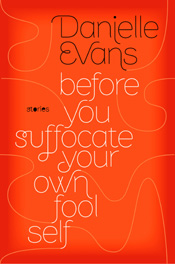 Before You Suffocate Your Own Fool Self is a debut collection of short stories by Danielle Evans. The stories are all about young people, most of them mixed-race, and offers thoughts about what growing up with that sort of dual identity means. On her blog, Evans says the book gets it’s amazing title from “The Bridge Poem” by Donna Kate Rushin. Evans adds:
Before You Suffocate Your Own Fool Self is a debut collection of short stories by Danielle Evans. The stories are all about young people, most of them mixed-race, and offers thoughts about what growing up with that sort of dual identity means. On her blog, Evans says the book gets it’s amazing title from “The Bridge Poem” by Donna Kate Rushin. Evans adds:
The title also reflects back on many of the characters in my book, who have often gotten themselves into their own messes, or are at a moment where they need to make a choice about who they’re going to be, and whether their best selves will hold their worst selves at bay, so the title also works as a link between the stories in the collection and a directive to the characters.
I think that description explains exactly what I enjoyed so much about this collection — it is full of people with potential, making choices about how they’re going to move forward. Despite the fact that many of the situations are unfortunate, frustrating, and sad, there seems to be a sense of optimism and a sense of humor in the stories. It’s a thoughtful book that’s allows for a smirk now and then, and it’s hard to ask for much more than that.
Sarah’s Key by Tatiana de Rosnay
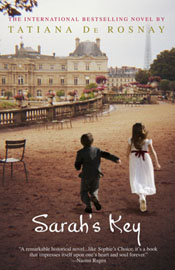 Sarah’s Key by Tatiana de Rosnay is a book about the Holocaust that manages to shed a completely new light on a historical event that it feels like we already know — a feat that I didn’t think was possible.
Sarah’s Key by Tatiana de Rosnay is a book about the Holocaust that manages to shed a completely new light on a historical event that it feels like we already know — a feat that I didn’t think was possible.
The story has two narratives – 45-year-old journalist Julia Jarmond, an American living in Paris with her husband in the present, and 10-year-old Sarah, a Jewish girl living in Paris in 1942. Julia is assigned to research the 1942 Paris round up of French Jews, who were held for days in the Vélodrome d’Hiver then sent to Auschwitz. This is an event I’d never heard of, which made even a fictionalized account of the event absorbing.
In addition to a new way to look at an old story, I was really impressed with the book’s pacing, which switched between narratives in such a way that you always have to read the next chapter to find out what is going to happen (like Dan Brown, except without being lame). Both Sarah and Julia are great characters — Sarah sometimes more that Julia, who could be sort of melodramatic, but still enjoyable. It’s not always an easy book to read, but one that I’ll be recommending.
The Genius Factory by David Plotz
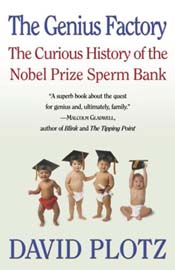 Once upon a time, an eccentric millionaire decided that it was a shame that really, really smart people don’t have many kids. So he contacted a bunch of Nobel Prize winners and asked them to donate their sperm for a very special sperm bank that would only sell sperm to women of the highest quality — Mensa types, that sort of thing. The result was the Repository for Germinal Choice, aka the “Nobel Prize Sperm Bank.” Can you imagine all the ways this could go wrong?
Once upon a time, an eccentric millionaire decided that it was a shame that really, really smart people don’t have many kids. So he contacted a bunch of Nobel Prize winners and asked them to donate their sperm for a very special sperm bank that would only sell sperm to women of the highest quality — Mensa types, that sort of thing. The result was the Repository for Germinal Choice, aka the “Nobel Prize Sperm Bank.” Can you imagine all the ways this could go wrong?
The Genius Factory is journalist David Plotz’s attempt at putting together the story of the sperm bank. Because medical records for sperm donors are notoriously secret, and most of the records of this extremely odd and problematic project are gone anyway, it’s a rather incomplete but nonetheless oddly fascinating story. What makes the book especially good is the way Plotz uses the sperm bank as a way to discuss much bigger issues about medical ethics, the growth of artificial insemination, and the nature versus nurture debate that many of the Genius Bank kids represent.
Guests of the Sheik by Elizabeth Warnock Fernea
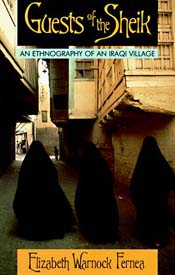 This book came as a recommendation from my friend Kristin after she learned how much I love memoirs about Western women in the Middle East. In Guests of the Sheik, newlywed Elizabeth Warnock Fernea moves to the small Iraqi village of El Nahra with her anthropologist husband to do an ethnography of the village. Because gender divisions in El Nahra in the late 1950s were even more stringent than they are today, Warnock Fernea spends most of her time living and learning from the women of the village.
This book came as a recommendation from my friend Kristin after she learned how much I love memoirs about Western women in the Middle East. In Guests of the Sheik, newlywed Elizabeth Warnock Fernea moves to the small Iraqi village of El Nahra with her anthropologist husband to do an ethnography of the village. Because gender divisions in El Nahra in the late 1950s were even more stringent than they are today, Warnock Fernea spends most of her time living and learning from the women of the village.
I read this book while on planes and found it pretty interesting, despite the mildly-dry sounding premise. Although it doesn’t cover anything especially different, it was fun to get a perspective from the late 1950s, when things were very different from now. I think Warnock Fernea does a fair job acknowledging her cultural misconceptions and biases, although it would have been nice to have more perspective from the women who live in the village. For people as in love with this particular topic as I am, Guests of the Sheik is worth taking a look at.
Packing for Mars by Mary Roach
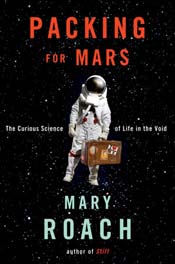 Everyone who has said good things about this book (I’m looking at you, Jill and Trisha), is totally right. In Packing for Mars, Mary Roach takes her unique sense of fun and unembarrassed curiosity and turns it on the United States space program, specifically what it takes here on Earth to get ready to go into space — How do we choose astronauts? Do humans go crazy in space? Can you have sex in space? What should astronauts eat? And how do they go to the bathroom?
Everyone who has said good things about this book (I’m looking at you, Jill and Trisha), is totally right. In Packing for Mars, Mary Roach takes her unique sense of fun and unembarrassed curiosity and turns it on the United States space program, specifically what it takes here on Earth to get ready to go into space — How do we choose astronauts? Do humans go crazy in space? Can you have sex in space? What should astronauts eat? And how do they go to the bathroom?
I read this book mostly on an airplane, which in retrospect was probably a silly idea — the chapter on motion sickness, combined with a bumpy landing into Denver, made me a little squeamish. But other than my own weird reading times, I thought this book was really enjoyable. I love that Mary Roach isn’t afraid to ask the questions we think of but don’t want to ask, or the questions that seem so off the wall they don’t even register. It makes her books a little cringe-worthy, but always entertaining and full of inappropriate dinner party anecdotes.
So that’s some of the stuff I’ve been reading for the last month, as succinctly as I can put it. Want to know more about any of the books? Ask away in the comments!

Comments on this entry are closed.
Oh, man, I can’t even imagine Packing for Mars on a plane. Not only the motion sickness chapter but also the re-entry chapter… yeesh!
Also, I’m glad you liked Sarah’s Key; it’s on my TBR pile but I’ve been feeling a skotch burnt-out on WWII fiction – nice to hear that it tackles the subject in a new way!
Fyrefly: Lots of chapters in Packing for Mars were sort of sketchy for reading on a plane, but I persevered! One of the flight attendants made a comment about the book, too, which was funny.
I did like the way Sarah’s Key was different. It felt more like a story, rather than a WWII story, if that makes sense.
Hmm, Packing for Mars might be just the thing to get a teenage boy reading something besides chess books.
Jeanne: Yes! I think he’d find it funny — there’s a lot of gross humor in the book that I think would give teenage boys a giggle or two
I liked Sarah’s Key, too, but Sarah’s story was more compelling to me than Julia’s, but she grew on me. I’ll link to this post on War Through the Generations.
Anna: I agree with you on that one. Julia grew on me, but at first I didn’t find her nearly as compelling as Sarah.
And eclectic, but interesting mix of books. I really liked Sarah’s Key when I read it. It was really engrossing. I’ve added Before You Suffocate Your Own Fool Self, Guests of the Sheik, and The Genius Factory to my own TBR pile.
Christina: Yeah, it did end up being pretty eclectic. I was trying to finish up books I’d borrowed from friends and the library, so that’s part of the reason it was so wide ranging. I hope you like the books if you get a chance to read them!
I have so been wanting to read something by Mary Roach, but just haven’t gotten around to it yet. Packing for Mars sounds particularly enticing- everyone says good things about it!
Jeane: It was very good! I also liked Stiff, about cadavers and human testing. I also read Bonk, but liked it just a little less.
Yay for lots of reading! I’m not getting much read now because of holiday preparations and traveling.
bermudaonion: I think my reading will slow down this month, but for a few weeks it was nice to just read as much as I wanted
I have Mary Roach’s Bonk and I’m almost afraid to read it, for fear of what she’ll ask and divulge!
softdrink: I read Bonk awhile ago and didn’t think it was too uncomfortable. I mean, just take the sex chapter from Packing for Mars and make it an entire book, and that’s sort of it So, maybe that is uncomfortable!
So, maybe that is uncomfortable!
I heard Mary Roach on Wait, Wait, Don’t Tell Me about a month or so ago and she was hilarious! Hearing her interview really got me wanting to read her books. Thanks for the great post!
Marie: I’ve never heard her do an interview or do a speech, but I bet she is funny! She has a really distinctive voice in her books.
I am glad you read and enjoyed Packing for Mars! I really love reading Roach’s books.
Trisha: Me too! The only one I have left is Spook, and then she needs to write more books.
I love the title of the Evans stories! That alone makes me want to read it.
Jenny: I do too. That’s one of the reasons I read it after hearing her speak at the WI Book Festival.
I so loved Sarah’s key. I want to read all her books.
Esme: I didn’t realize she had more books – I will have to look for them.
It’s true – you can get a lot more reading done when you stay offline. I’ve read more in 2010 than I have since my pre-blogging years between traveling and recuperating from shoulder injuries!
I probably should read some Mary Roach one of these days. Glad you liked Sarah’s Key – I’ve had it buried in TBR for a while.
Florinda: It’s a bummer about your shoulder – I hope things are getting better! I think you should try Mary Roach — you’ll know pretty quickly if her style is for you or not
Glad you liked Packing For Mars. I LOVED Bonk !
Maphead: Bonk wasn’t my favorite, but that’s not saying much since I really enjoy all of her books and still liked that one a lot
Isn’t that the truth? If you stay offline, you get so much done, but yet you don’t get to share all the fun stuff you get done. Glad you had a good time reading. I haven’t been able to read at all for 2 months and it is KILLING me.
Girl from the Ghetto: Exactly! It’s fun to be offline, but then I miss being online and getting to interact with people. Tricky balance. I’ve been reading so much lately, which is awesome, but also makes me perpetually behind on reviews…
Packing for Mars sounds right up my alley – now let’s hope my library carries it!
Scott: I’m sure your library will have it. If not, make them order it! Mary Roach has a distinctive voice and approach that makes me want to read everything she’s written.
They actually had both the audio book and the regular edition, so I requested both. I’ll probably read whichever is available first, unless you think one would be more appropriate?
Scott: I’m not sure. I’ve never listened to a Mary Roach book on audio, but I feel like they’re written in a way that would work well as an audio book. There’s lots of short scenes and the book doesn’t really build an argument, so if you miss something it won’t be too confusing. I’ll be curious what you think if you do go with the audio version.
I am currently reading this book. I think that I am going to read some more of her work. I like her comic insight on some of the things that NASA does and tries to remain serious.
Yeah, that’s a great point — I like that about Mary Roach as well.